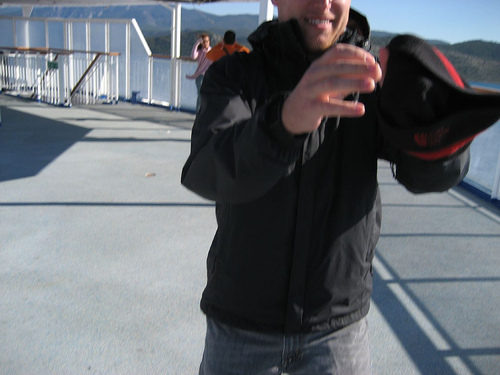
NPR runs a weekly column/ feature called This I Believe. To find out more about it, you can read on their site. This past week featured a bold essay from Penn Jillette, entitled "There is No God." My initial ripostes, in all their un-edited glory:
I believe that there is no God. I'm beyond Atheism. Atheism is not believing in God. Not believing in God is easy -- you can't prove a negative, so there's no work to do.
Jillette makes an important point here, right off the bat. Unfortunately, he also ostracizes the rest of the God-denying community by claiming he's reached some higher understanding than the majority of the simpleton un-believers. He then proceeds to use the same circular argument that Atheists themselves use to entrench their position. He just uses an elephant instead of the oft-used Santa Claus illustration.
Did I mention that my personal heartfelt definition of the word "elephant" includes mystery, order, goodness, love and a spare tire?
He gets down to the marrow of the issue by the end of his opening paragraph: he has 'personal, heartfelt definition's for reality and all that it contains, and, simply for the fact that these definitions are his own, they therefore must be right and true. He creates an absolute, exclusive position that you must accept if you are open-minded. More on this in a minute...
...some leap of faith that helps one see life's big picture, some rules to live by. So, I'm saying, "This I believe: I believe there is no God."
He accomplished his goal - making the biggest leap of faith a person can make in this life.
I'm not greedy. I have love, blue skies, rainbows and Hallmark cards, and that has to be enough... Just the love of my family that raised me and the family I'm raising now is enough that I don't need heaven.
So he has love...but he doesn't have forgiveness:
Believing there's no God means I can't really be forgiven except by kindness and faulty memories.
How can you have love, but not really have any form of true forgiveness? Isn't that what the ultimate form of love is? Loving something that is perfect is easy - there's nothing to not love about it. Loving the imperfect - taking something with all its flaws and weaknesses, and loving it even more for the gaps in perfection that it bears - that is the essence of real, true love.
Believing there's no God stops me from being solipsistic. I can read ideas from all different people from all different cultures. Without God, we can agree on reality, and I can keep learning where I'm wrong.
And we're back to creating those exclusive points of view that we must be open-minded enough to accept. Jillette's problem is that he's so open-minded that his brains fall out. He makes the essential argument of the relativist movement itself - he claims to be able to be open to all kinds of different views, to say that what he believes is his own truth and what anybody else believes is their own truth, and everyone should agree that this is reality.
Except that can't be reality. To make that claim, that truth is relative, is to make an exclusive claim in and of itself. It necessarily says that my (David Knowles') view, an exclusive belief of a single God and single truth in this life, is wrong, because it doesn't accept other views. So the view that accepts all views must deny the views that won't accept all views - and so it defeats itself.
So, believing there is no God lets me be proven wrong and that's always fun. It means I'm learning something.
Ironic. I doubt he's very open to learning about my separate reality that believes in God. Because that would prove him wrong, and that's always fun.
No God means the possibility of less suffering in the future.
Now, even for a guy like Jillette, this is idiotic. There's one thing everyone in the entire course of human history shares - we're all going to break down and die at some point. Suffering has, relatively speaking, remained a constant throughout history. There's no getting around suffering in this life - with or without God. But, without God, there is certainly no getting around suffering in the next life.
Believing there is no God gives me more room for belief in family, people, love, truth, beauty, sex, Jell-o and all the other things I can prove and that make this life the best life I will ever have.
His last statement leads me to clarify the over-arching attitude of my response - I'm not angered or upset by what he says so much as I am, simply, saddened. To think that he, and others, truly believe that beauty, sex, and Jell-o are as good as things will ever get. To look at what's wrong in this world and shrug your shoulders and "make the best" of this life? That's an astoundingly flippant response to this life.
But that's how you have to look at the gift of life if you can't accept the reality of the One that gives the gift.
"The fool says in his heart, 'There is no God...'" - Ps. 14:1















No comments:
Post a Comment